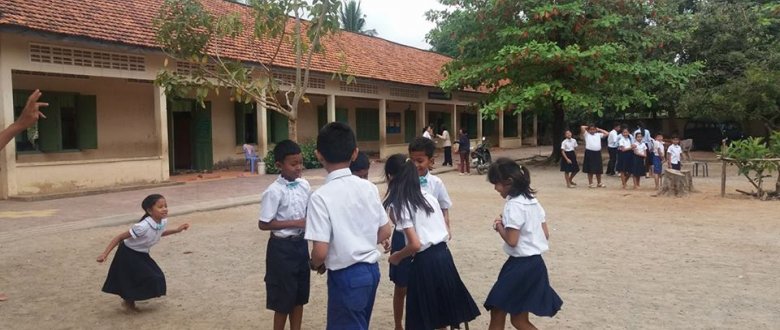
Every year, VVOB Cambodia offers 6 to 8 internship opportunities to Flemish students to teach mathematics and science to Cambodian pupils. They are teamed up with Cambodian student teachers who help translate their lessons from English into Khmer for the pupils. As a team they prepare their lessons, practice their teaching skills with a class of pupils and give each other feedback and support.
Earlier this year three Flemish students Stephanie De Vries, Eva Van Lieshout and Hannah Guypen arrived in Cambodia. Until mid-April they are teaching as interns at Krapeu Ha primary school in the province of Kandal.
Classroom management for big groups
What they experience during their internship at a Cambodian primary school is often very different from what they would experience at an average Belgian primary school. “By teaching classes that have an average of 40 pupils, you automatically learn a lot about classroom management. Finding an effective way to keep the pupil’s attention is crucial.”, says Hannah. To retain order in such a big class, teachers often find it easier to have the pupils seated at their desks for the entire lesson. On the contrary, Eva experienced that when she activated the pupils through a learning game, she was able to grasp their full attention: “We played a learning game, just a little one, and it was unbelievably inspiring to see how interested the pupils were and how much they enjoyed learning that way.” Stephanie took it a step further even, literally, she took the lesson outside the classroom: “I have always believed that outdoor learning is a very good way of teaching and I finally had the chance to experience it here. With the support of the school principal and our mentor, I planned math activities in the school playground. As we left the classroom to do the fun learning activities, the pupils were excited and paid much more attention.”
Limited teaching and learning materials
The teaching and learning materials that Cambodian primary schools can offer to their teachers and pupils are often limited. It stands in contrast to the array of materials that Belgian primary school teachers self-evidently count upon. “In Belgium I would easily print materials and give each pupil a copy.”, says Stephanie. “This is just not possible here! It pushes me to be more creative with the little materials I have and I feel like it brings teaching back to its basics.”, she continues. All three interns agree that it is a positive experience to go back to the basics of teaching where you don’t depend on seamlessly unlimited resources and sometimes even expensive materials. Hannah is certain: “I believe that we can learn and be inspired by this ‘less is more’ way of teaching back home in Belgium.”
The effect of language and culture
The interns also experienced something else beside the challenging craftsmanship of teaching: the language barrier and the cultural differences. Eva remembers it clearly: “I will never forget how it felt to join a group of people to cooperate with while not being able to understand a single word they said. Having experienced this gives me a better understanding of how foreign pupils must feel when they are placed in an unknown environment with an unfamiliar set of habits and a language they don’t understand.”
Stephanie, Eva and Hannah are decidedly positive about their teaching practice in Cambodia. With a smile they conclude: “We are only a month into our internship, this is just the beginning of our intriguing and unforgettable journey!”







